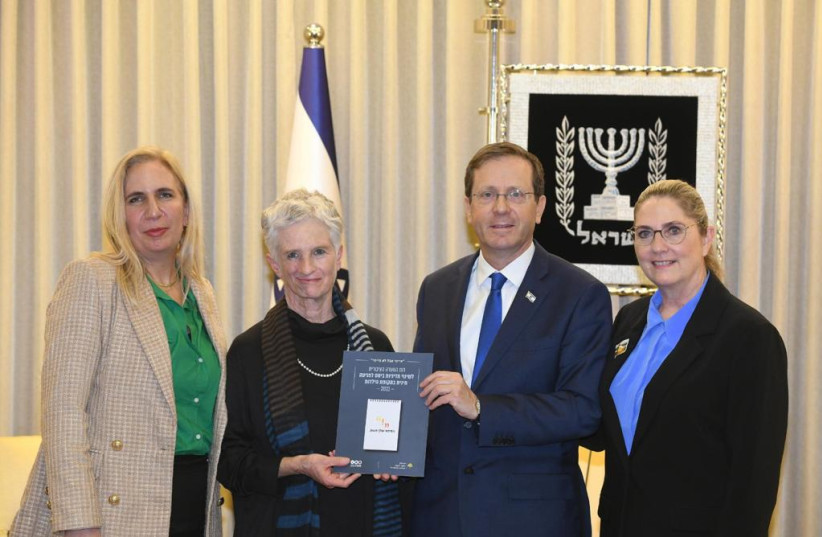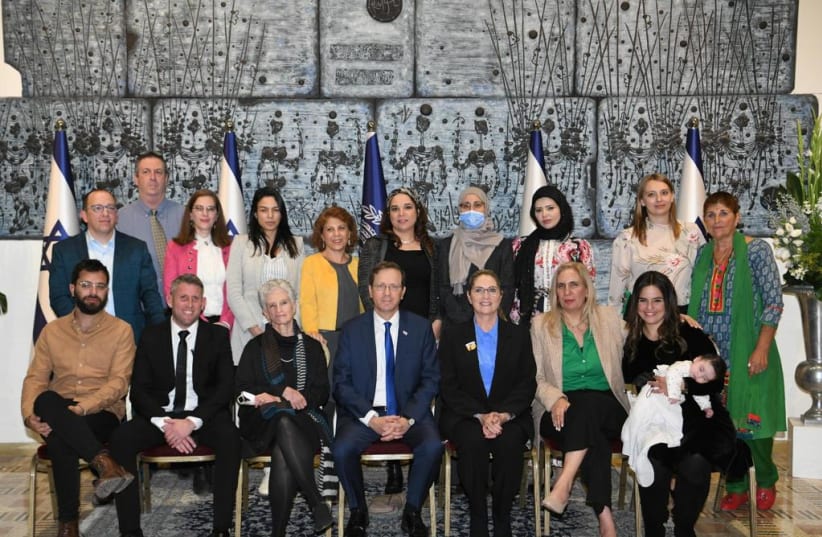Amid increasing incidents of sexual violations against minors by pedophiles and sexual predators, representatives of the Haruv Institute and Tel Aviv University on Monday presented the report of the Public Committee for Changing Policy with regard to child victims of sexual abuse to President Isaac Herzog and his wife Michal who is a criminal lawyer.
In order to gain a broad perspective of the situation, the Public Committee comprised people from the fields of social, work, law, education, psychology and social activism.
Prof. Carmit Katz from TAU’s School of Social Work said that the committee focused on sexual abuse of children out of the understanding that this is a very serious social problem with long-lasting and difficult consequences. “It is a problem that has not received sufficient attention from society and the state,” she said.
Until relatively recently, Israeli society and state did not make a major issue out of sexual abuse of children.
The Malka Leifer case, which almost caused a diplomatic rift between Israel and Australia, may have sparked the genesis for a change in policy.


Leifer, an Israeli employed as a principal of a haredi (ultra-Orthodox) girls’ school in Melbourne, Australia, is currently on trial on 74 charges of sexual abuse against her students. Leifer, who returned to Israel in a futile effort to avoid criminal charges, was extradited after six years of battling the legal systems of Israel and Australia.
Over the years, Israel has unfortunately become a haven for Jewish – mostly religious – sex offenders who are attempting to escape the forces of law in the countries in which they were living before relocating to Israel. In general, Israel has been reluctant to accede to extradition requests, though in Leifer’s case, the authorities were left with no option.
Even before that, the case of Manny Waks, a former student in Melbourne’s Chabad Yeshiva and victim of sexual offenses that had been committed against him, had reported incidents to school authorities. When nothing was done against the perpetrator, Waks went to the police and then to court. The result was a commission of inquiry into institutional responses to allegations of sexual offenses against children and the resignation of a large number of people at the top of the yeshiva’s totem pole, as well as of various Catholic institutions. Waks, who now lives in Israel, works internationally to help prevent the sexual abuse of children.
More recently, again in Melbourne, Rabbi James Kennard, the principal of Mount Scopus College, which is one of the largest Jewish Day Schools in the world, became aware that a popular and long-standing teacher at the college had engaged in sexual misconduct with a number of students. Contrary to the norm, Kennard made no effort to sweep the matter under the carpet. There were too many allegations that could not be ignored, and he asked the teacher to step down. He also sent a letter to past and present students, asking them to come forward and tell their stories if they were amongst those who had been sexually abused.
IN ISRAEL, according to the report of the Public Committee, many victims remained silent for years because when they first tried to say anything, no one believed them.
“Your story is important,” members of the Public Committee told each of the 505 people who submitted oral and written testimonies during the period September 2020-September 2021.
The overwhelming majority of testimonies were in Hebrew, but there were also some in Arabic, English and Russian.
Most of the people submitting testimony were ages 34-36, with some 25% under the age of 27.
Of those who responded to the Public Committee’s invitation to tell their stories, 87% were female. Of the total respondents, 88.4% were Jewish, 6% Moslem and 5.5% who did not identify with any faith.
Geographically, 57% came from the center of the country, 23% from the north, and 19% from the south.
Collectively, they came from all strata of the population and all levels of society. 25% had academic degrees, and the same ratio had 12 years of schooling – meaning that 75% had less.
The average age of victims of abuse was eight, though 25% were as young as five years old. Some were abused only once, but 71% told of continuing abuse.
There were 41% who said they had been abused by someone they knew – albeit not a relative, while 25% said that they had been abused by one or more relatives.
Seemingly ignoring the existence of The National Council for the Child, which was established in 1980 by President Yitzhak Navon, and which advocates the rights of children in Israel and prepares a comprehensive annual index of almost every issue that affects the rights and abuses of children, the Public Committee recommended the creation of an authority for the protection of children in the State of Israel.
Herzog commended the committee on its report saying that through the transparency of the statistics, it brought out the voices of the victims.
He urged the committee to go out in full force to bring the issue before the public.
Commenting that he realized how difficult this would be, Herzog stressed the need to build a better future for Israeli children so that none would have to experience such terrible traumas in their childhood.
Noting that sometimes children don’t understand why their parents don’t protect them, Herzog told the members of the Public Committee: “What you have done is a great deed.”
Michal Herzog also congratulated them on the report, saying that it signified the beginning of a breakthrough, “but there is still a lot more room for more change.”
